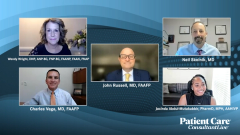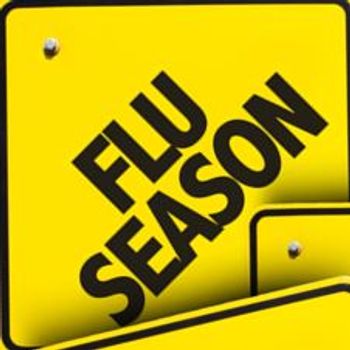
Case 2: 50-Year-Old Male Patient With A Heart Disease
A panel of experts in vaccination efforts discuss the available influenza vaccines for a 50-year-old male patient with a heart disease.
Episodes in this series

John Russell, MD, FAAFP: With a second case, so, this is a 50-year-old male patient who has had a history of NSTEMI [non-ST-elevation myocardial infarction]. He's aware the flu season is coming. He's someone who's really not that interested in vaccines. When you start talking about thinking about getting a flu shot this season, he seems a bit uncomfortable. So, starting with you, Chuck, knowing what you know, how there is a tether between cardiac disease and influenza, how are you using that in your discussion with this vaccine-hesitant patient with a clear cardiac history?
Charles Vega, MD, FAAFP: Right. And this is one of my closing arguments for vaccines, because many patients just think of influenza as a bad cold. “I never get sick,” etc... We've heard lots of excuses, but they have a history of diabetes, hypertension, hyperlipidemia. They have a history of 3 stents in their coronary arteries, a TIA [transient ischemic attack] or stroke, and those folks are, of course, at higher risk for cardiovascular events. And we know that influenza, like other inflammatory infections, like COVID-19, like a mycoplasma, is associated during that acute infectious period with a lot of systemic inflammation, makes those plaques in your arteries unstable. They rupture, and lo and behold, myocardial infarction or stroke. So, there's good data that, in terms of a population-based or cohort studies, that vaccination can actually reduce the risk of myocardial infarction. So, I don't know of any randomized trials [since] that would take that would take a big population study, but I believe that if you can prevent influenza through vaccination, you prevent some of those cardiovascular events. And even for folks who think of flu as just a bad cold or nothing to worry about, you can get their attention, especially if they've had heart disease or stroke with that line, and that gets shots in arms for me.
John Russell, MD, FAAFP: And I think there was a Scottish study that had a 10-fold increase in having an MI [myocardial infarction] and a 7-fold increase in having a stroke in that kind of 3-day period that you were talking about. So, Neil, you like to be very persuasive some time in talking about academic issues. When you have someone who's very entrenched against being vaccinated. And you just heard Chuck mention about what a benefit it would be to them. How do you finagle that?
Neil Skolnik, MD: Yeah, John, I think that's a common issue and it's critically important. A couple of thoughts, and one is a reflection on something that Chuck said very early on about trust. There was an article about 2 years ago by the former statesman and Secretary of State, George Shultz. It was in The Washington Post, just before his 100th birthday. And he said in his 100 years, he has learned the single most important thing in life is trust. And that is, if trust is in the room, you can accomplish anything. And if it’s not, nothing you do matters. And Chuck, you mentioned this when we were starting out. And I think it's so important. When we talk to our patients or when we talk to patients that are seeing us, but they trust us because we're part of the system…. or we listen to them, and that's the second point. We first need to—classic motivational interviewing—listen to them. If they are hesitant, people trust us more when we address their needs, not our needs. So, what is it that makes you hesitant? And I think sometimes we get this backwards, John, that we wait until the end of a visit and we're 3 patients behind, and then we say the nurse will be in and give you a flu shot and they [say], “I don't want it.” And now I'm 3 patients behind and I got nothing left. …We might change the way we do things; start to visit with, “We're going to give you a flu shot at the at the end of the visit.” And if they say no, we switch our agenda for the visit because they're going to come back for their hypertension, diabetes check, and say, “Let's talk about this for a minute. What's your concern?” Listen, first, Steve Covey, the author, said, “First seek to understand, then seek to be understood.” Utilizing listening, utilizing the trust that is implicit in our position, and then addressing directly what their concerns are and following it, as Wendy said, with a direct recommendation after having addressed those concerns.
John Russell, MD, FAAFP: So, Wendy, just kind of finishing up this patient with you, and I imagine also during the middle of flu vaccine, you're going to have somewhere in that 2 to 5 range of different vaccines in your fridge. This is a high-risk guy; he's 50-years-old, you know? Can he get some of these kinds of fancy high-dose flu [vaccines]? Can he get the Fluad? And what would you recommend for him or would you just recommend the standard vaccine for him?
Wendy Wright, DNP, ANP-BC, FNP-BC, FAANP, FAAN, FNAP: So, the high-dose flu is really indicated for 65 [years] and older. I do stock that in my refrigerator. We give it to everyone 65 [years] and older. The other vaccines, we do have available, and we have 2 or 3 different brands, and I do that because what I never want is to not have enough vaccine. So, I don't put all my eggs in 1 basket. I order the year before, multiple different brands, so that I have them. What I would say is that I do exactly what Neil said, except I change a couple of things up. Usually, it's about 5 minutes into the visit that I say, “I'd like your permission to look at your vaccine record.” After I've verified allergies, “I'd like to look at your vaccine record. Would that be okay?” And I'll look and I'll say, “I see that you're due for the flu shot today. Let's get that on board. Okay? We can do that at the end of the visit.” And then if [they say,] “Yes. Okay.” I'll write a note and then I'll say we'll get it done at the end and then I'll move on. If there is some hesitation, I come back and say, “What's standing between you and getting the vaccine? What's your worry?” And so those are just some of my strategies. And then I make a strong recommendation and I say, you know, we've got the vaccine here. If they leave without it, I'll say, “Please let us know. We're happy to get that on board.” The last thing I would say is we learned this with the HPV [human papillomavirus infection] studies, that the more you talk about science, the longer you talk about the vaccine, the less likely they are going to take it. So, I don't deep dive into any of the heavy science. I will if they want me to, but it's just a concise recommendation: “You are at an increased risk because of your heart disease. Influenza is inflammatory.” They've heard this now with COVID-19. So, you can often equate the 2. “I recommend you get the vaccine on board today.”
Transcript is AI-generated and edited for clarity and readability.
Newsletter
Enhance your clinical practice with the Patient Care newsletter, offering the latest evidence-based guidelines, diagnostic insights, and treatment strategies for primary care physicians.

































































































































